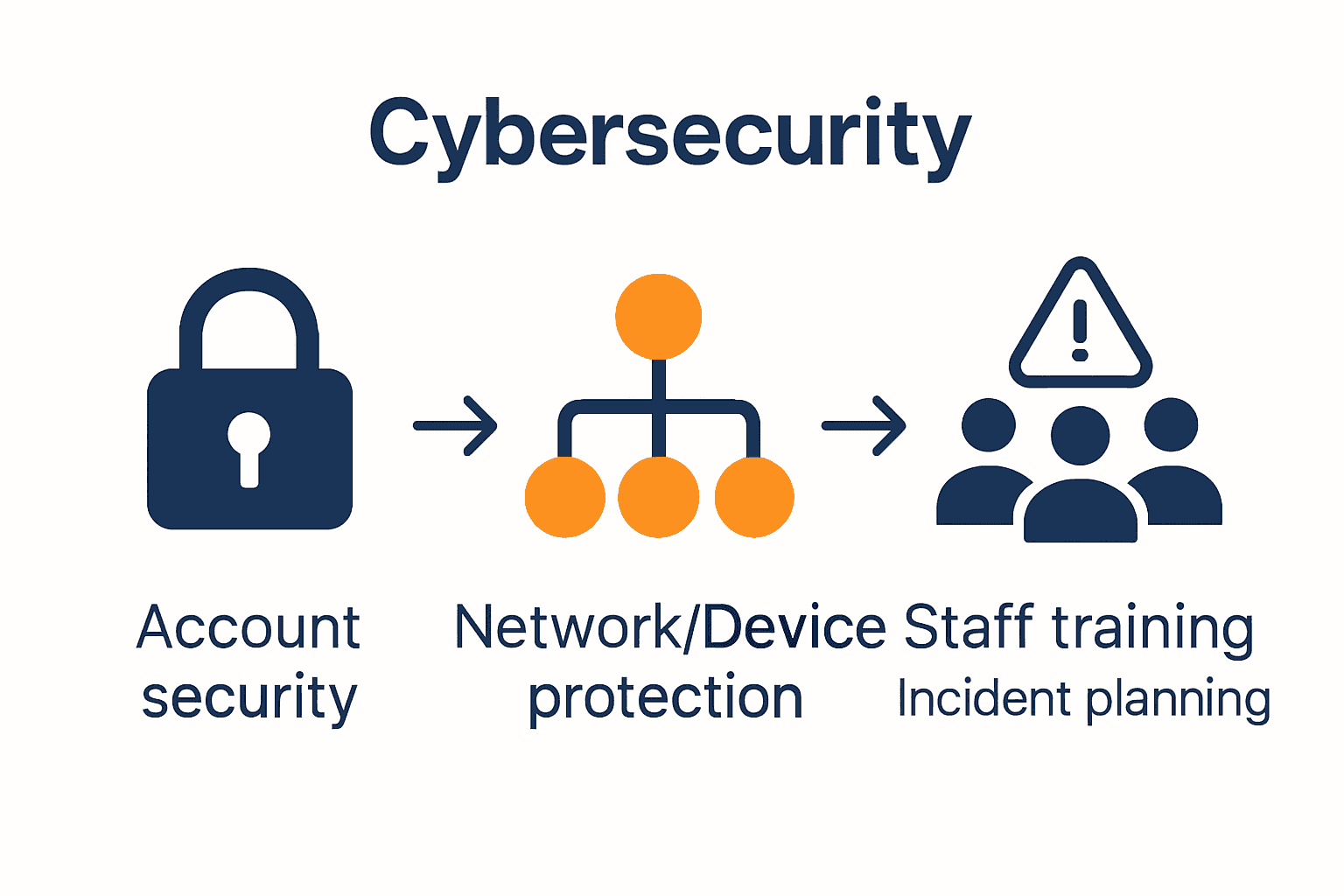Cybercriminals target small businesses in Australia every nine minutes, making digital security a daily challenge for Brisbane SMBs. With online threats growing more sophisticated each year, even minor gaps can leave your company exposed to costly breaches. By understanding what defines cybersecurity best practices, you gain the tools to protect your valuable data, maintain business operations, and build trust with customers and partners.
Table of Contents
- Defining Cybersecurity Best Practices
- Account Security Measures (MFA, Passwords)
- Network & Device Protection Practices
- Staff Training And Incident Plans
- Legal Responsibilities And Data Obligations
Key Takeaways
| Point | Details |
|---|---|
| Cybersecurity Best Practices | Implementing a multi-layered cybersecurity strategy is essential for protecting digital assets and maintaining operational continuity. |
| Account Security | Utilize robust password policies and multi-factor authentication to secure access points against unauthorized entry. |
| Network and Device Protection | Establish comprehensive defenses through firewalls, secure networks, and regular software updates to safeguard digital infrastructure. |
| Staff Training and Incident Plans | Develop a culture of cyber awareness through training and have clear incident response plans to effectively manage potential cybersecurity threats. |
Defining Cybersecurity Best Practices
Cybersecurity best practices are strategic approaches small businesses use to protect their digital assets, networks, and critical information from potential cyber threats. According to the Australian Cyber Security Centre, these practices form a comprehensive shield against increasingly sophisticated digital risks that can compromise business operations.
At its core, cybersecurity best practices encompass a multi-layered strategy that goes beyond simple technological solutions. As outlined by Onya Magazine, these practices typically include:
- Enforcing strong password protocols
- Implementing regular software updates
- Conducting systematic employee cybersecurity training
- Maintaining consistent data backup procedures
- Utilising robust firewalls and antivirus protection
For Brisbane SMBs, understanding and implementing these practices isn’t just about technology protection. It’s about creating a culture of digital resilience that safeguards your business’s reputation, financial stability, and operational continuity. Learn more about computer security best practices to develop a comprehensive approach tailored to your specific business needs.
The landscape of cyber threats is constantly evolving, which means cybersecurity best practices are not static. They require ongoing assessment, adaptation, and commitment from every team member. By treating cybersecurity as a dynamic, collaborative effort rather than a one-time technical solution, Brisbane businesses can significantly reduce their vulnerability to potential digital attacks.
Account Security Measures (MFA, Passwords)
Account security is the first line of defence against cyber threats for Brisbane small businesses. Passwords and multi-factor authentication (MFA) represent critical tools in protecting digital access points and preventing unauthorized entry into your business systems.
Creating robust password strategies involves more than just generating complex combinations. Best practices recommend:
- Using passwords longer than 12 characters
- Incorporating a mix of uppercase, lowercase, numbers, and symbols
- Avoiding personal information or common dictionary words
- Implementing unique passwords for each account
- Utilizing password manager tools for secure generation and storage
Multi-factor authentication adds an essential additional layer of security beyond traditional passwords. By requiring multiple verification steps, MFA significantly reduces the risk of unauthorized access. This might include:
- Biometric verification (fingerprint, facial recognition)
- Time-based one-time passcodes
- Physical security keys
- SMS or email verification codes
For Brisbane SMBs, implementing comprehensive account security isn’t optional. Learn more about computer security best practices to develop a holistic approach that protects your digital infrastructure. Regular password audits, employee training on authentication protocols, and staying updated on emerging security technologies will help create a resilient defence against potential cyber intrusions.

Network & Device Protection Practices
Network and device protection represents a critical defence strategy for Brisbane small businesses against increasingly sophisticated cyber threats. Protecting your digital infrastructure requires a comprehensive approach that goes beyond basic technological solutions, addressing both technological and human elements of cybersecurity.
Key network protection practices for SMBs include:
- Implementing robust firewalls with advanced intrusion detection
- Configuring secure wireless networks with strong encryption
- Establishing segmented network zones to limit potential breach impacts
- Regular network vulnerability scanning and penetration testing
- Maintaining up-to-date firmware and security patches across all network devices
Device protection strategies are equally crucial. Explore our comprehensive guide on securing business laptops to understand the nuanced approaches needed to protect individual endpoints. This involves:
- Installing endpoint protection software
- Enabling automatic system updates
- Restricting administrative access
- Implementing device encryption
- Creating clear policies for personal and work device usage
For Brisbane businesses, network and device protection isn’t just a technical requirement but a strategic imperative. By developing a holistic, proactive approach to cybersecurity, SMBs can create resilient digital environments that protect against potential cyber risks while maintaining operational efficiency.
Staff Training And Incident Plans
Building a robust cybersecurity strategy for Brisbane SMBs goes far beyond technological solutions. Staff training and comprehensive incident response plans are critical components that transform employees from potential security vulnerabilities into your organisation’s first line of defence.
According to Onya Magazine, effective cyber awareness training is essential for creating a proactive security culture. Key training elements should include:
- Recognising phishing and social engineering attempts
- Understanding password security protocols
- Identifying suspicious email and website indicators
- Reporting potential security incidents immediately
- Practicing safe browsing and download habits
Developing a comprehensive incident response plan requires strategic preparation and clear communication channels.
 This plan should outline:
This plan should outline:
- Immediate steps for containing a potential security breach
- Roles and responsibilities of team members during an incident
- Communication protocols for internal and external stakeholders
- Data recovery and system restoration procedures
- Post-incident review and learning mechanisms
Learn more about computer security best practices to develop a holistic approach that transforms your workforce into a powerful cybersecurity asset. Regular training, simulation exercises, and continuous learning are key to building a resilient organisational defence against evolving cyber threats.
Legal Responsibilities And Data Obligations
Navigating the complex landscape of cybersecurity legal responsibilities is crucial for Brisbane SMBs. The digital ecosystem demands more than just technological safeguards. It requires a comprehensive understanding of legal frameworks and data protection obligations that extend far beyond simple compliance checkboxes.
According to the Australian Home Affairs cybersecurity strategy discussion paper, SMBs must proactively adhere to national security regulations. Key legal responsibilities include:
- Protecting customer and employee personal information
- Implementing robust data breach notification protocols
- Maintaining transparent privacy management practices
- Ensuring secure data storage and transmission
- Conducting regular privacy impact assessments
Data obligation frameworks typically require businesses to:
- Identify and classify sensitive information
- Establish clear data handling and retention policies
- Implement encryption for sensitive data transfers
- Create comprehensive documentation of data management practices
- Develop mechanisms for immediate breach response and reporting
Learn more about computer security best practices to develop a holistic approach that not only protects your business but ensures you meet critical legal and ethical standards. Remember, in the digital age, legal compliance is not just about avoiding penalties but building trust with your clients and stakeholders.
Strengthen Your Brisbane Business with Proactive Cybersecurity Support
Small to medium Brisbane businesses face increasing challenges in protecting sensitive data amidst evolving cyber threats. The article highlights critical pain points such as the need for strong password protocols, multi-factor authentication, network and device protection, staff training, and meeting legal data obligations. These areas require more than just awareness – they demand expert ongoing management to reduce risk and maintain compliance.
IT Start specialises in delivering tailored managed IT support and cybersecurity services designed specifically for Brisbane SMBs. Our local expertise and commitment to proactive defence mean you can protect your digital infrastructure with confidence. Whether you need help implementing robust firewall configurations or training your team to recognise cyber threats, we provide transparent, certified support aligning with your business goals.
Don’t wait until a cyber incident disrupts your operations or damages your reputation. Take the first step towards resilience today. Discover how IT Start’s strategic IT management solutions can safeguard your business by booking a free consultation at Contact IT Start. Learn more about cybersecurity best practices and how to build enduring digital trust.
Frequently Asked Questions
What are the key cybersecurity best practices for small businesses?
Cybersecurity best practices for small businesses include enforcing strong password protocols, implementing regular software updates, conducting employee cybersecurity training, maintaining consistent data backup procedures, and utilizing robust firewalls and antivirus protection.
How can multi-factor authentication improve account security?
Multi-factor authentication (MFA) improves account security by requiring multiple verification steps for access, such as biometric verification, one-time passcodes, or physical security keys, significantly reducing the risk of unauthorized access.
What should a comprehensive incident response plan include?
A comprehensive incident response plan should include immediate steps for containing a security breach, roles and responsibilities of team members, communication protocols, data recovery procedures, and mechanisms for post-incident review and learning.
What are the legal responsibilities regarding data protection for small businesses?
Small businesses must protect customer and employee personal information, implement data breach notification protocols, maintain transparent privacy practices, ensure secure data storage and transmission, and conduct regular privacy impact assessments.



